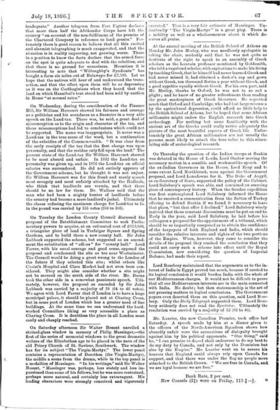On Wednesday, during the consideration of the Finance Bill, Sir
William Harcourt showed his fairness and courage as a politician and his soundness as a financier in a very able speech on the Land-tax. There was, he said, a great deal of misconception as to the origin and character of the tax, and these misconceptions had led to conclusions which could not be supported. The name was inappropriate. It never was a Land-tax in the true sense of the word, but a continuation of the subsidies of the Commonwealth. "It was clear from the early receipts of the tax that the first charge was upon personalty, and that the residue only fell upon the land." The present state of the Land-tax Sir William Harcourt showed to be most absurd and unfair. In 1832 the Land-tax on personalty was given up, and in 1876 the Land-tax on official salaries was surrendered. He did not entirely approve of the Government scheme, but he thought it was not unjust. Sir William Harcourt was for this frank and manly speech most savagely and most unfairly attacked by the Radicals, -who think that landlords are vermin, and that there should be no law for them. Dr. Wallace said that the man who had been a mighty hunter of landlords before the country had become s. mere landlord's jackal. Ultimately the clause reducing the maximum charge for Land-tax to Is. in the pound was carried by 155 votes (258 to 103).


































 Previous page
Previous page